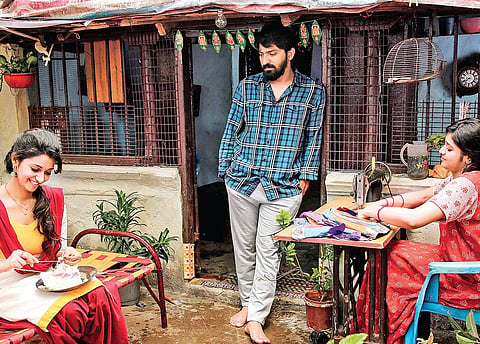

I had no idea what to expect of Meyaadha Maan. I knew Karthik Subburaj had produced it and that it was called ‘Royapurathu La La Land’. I wasn’t sure what that meant because I thought our films do the song-and-dance routine so much better than La La Land. I found myself thoroughly enjoying Meyaadha Maan really early on. I went in expecting a rom-com, but I came out feeling as if I had been witness to the work of someone who thinks deeply about the politics of love, of the politics of social justice, and someone who definitely has a whacky sense of humour with a lovely eye for casting.
Meyaadha Maan has Vaibhav Reddy as Idhayam Murali, who reminded me of Vijay Sethupathi, and should definitely find himself in more lead roles in comedy flicks after this, and Priya Bhavani Shankar as Madhu, the object of his long-time one-side love. Murali is from Royapuram, sings in a light music troupe and is friends with the local gana troupe and nadaswaram and thavil players (a lovely tribute to three different forms of music that converge in one space, each eating into the other’s business), while Madhu is from Anna Nagar and her father enjoys his music on an old gramophone. Sudar is in love with Vinoth and unable to express it to him.
While I understand that this film can be seen as a rom-com—after all, there are two endearing love stories -- I also think that it is a great sibling film. There’s even a tribute to Pasamalar in the fantastically staged ‘Thangachi song’ where Sudar and Murali wear Savithri and Sivaji Ganesan masks, which is straight from Pasamalar. What’s even more heartening is how much depth Sudar’s character has (as well as screen space). The only song sequence with a man-woman element in this movie in fact, is between the siblings. There’s no ‘love duet’. The autonomy she enjoys in that household without the usual cinematic oppressive ownership from her brother made Sudar stand out for me.
Madhu’s evolution, from being engaged to someone else to asking to sleep with Murali so that she can stop her wedding, is convincing. The humour offers a beautiful step up that allows you to take the leap. A love failure, TASMAC song that is a staple today, sees a wonderful subversion (and is yet another place Rathna Kumar shows us his humour and politics) when Vinoth tells Murali, ‘when only Madhu has left you, why are you writing a song against all women?’ And hilarity ensues in the form of Address song whose lyrics go: ‘S. Madhu, friend of Priyanka, B.Sc MBA (bar), No 6, Kurukku Theru, Shanti Colony, Chennai’. The role of the friend mentioned in this song, Priyanka is a superb, quirky addition. She, too, is a part of the story.
For a film so aware and keen on being right – Murali’s comment on women wearing dupattas and not covering what they are meant to (which brought applause from men in the audience) rankled. Well, of course, the filmmaker has every right to create a man who isn’t a warrior of women’s rights, but when the men in the audience find legitimacy of their control over women’s bodies (what their dupattas should do and shouldn’t), it makes you squirm in your seat.
So, I suppose it is a collective problem. I wasn’t a fan of that line and the film didn’t need it. I also had this overall feeling that the maker was using people’s ‘locations’ (social and economic) as a prop as opposed to engaging with it a little deeper. But for a first-timer, that Rathna Kumar managed to pull off this many laughs and put this much heart into a small film, and got so much right, and gave us the memorable Sudar and ‘Thangachi song’, is all credit to him indeed. He must rightfully bask in the glory of his creation and come back stronger for the next one. (The writer is a city-based journalist and editor)
Krupa Ge
Twitter@krupage
This weekly column is a rumination on how women are portrayed in cinema